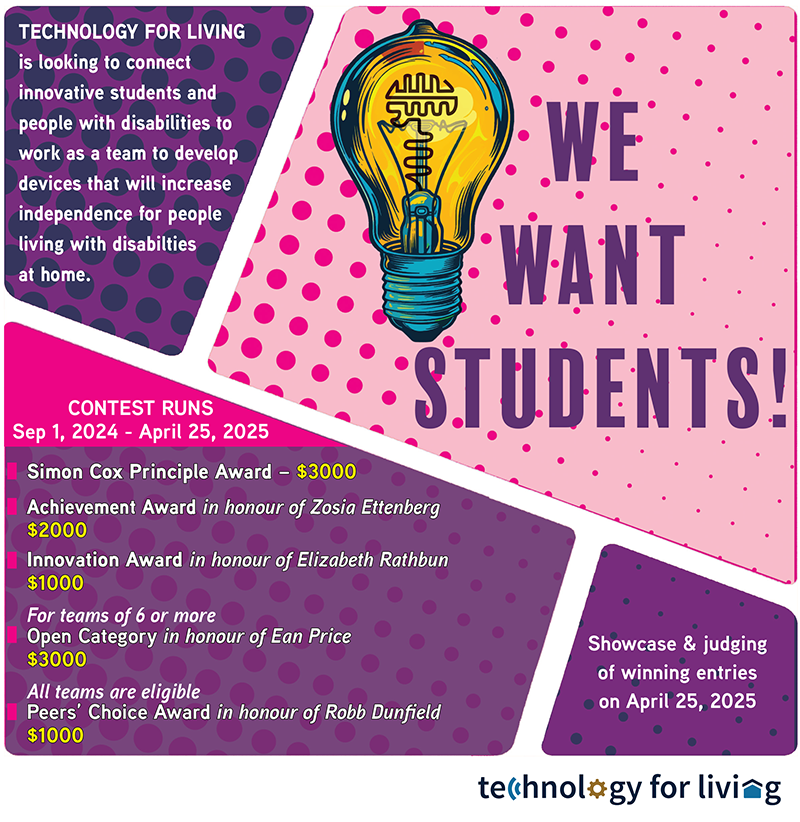Looking for student participants from your cohort
The Simon Cox Design Student Competition helps student see some of the challenges faced daily by people living with disabilities. Imagine not being able to pull your bed covers up or down or not being able to speak loud enough to communicate with Google Home. These challenges have been successfully adressed by creating solutions (the ‘blanket mover’, ‘the chameleon’) for this competition in previous years. Life enhancing equipment is being invented and provided to people with severe physical disabilities right here in the Pacific Northwest.
We would love to have your students involved!
Maybe you can even work the competition project into part of your students’ curriculum?
Technology for Living can arrange for one of our members to visit your class or talk via ZOOM about the competition and how to match up your students with one of our members to help testing their prototypes.
We are offering interested students a unique opportunity to create or adapt biomedical, assistive and home automated devices. All of this takes place in a team environment together with people living with disabilities.

Students and People living with disabilities
As a team they will collaborate in creating biomedical, assistive,
home automated devices to expand independent living at home.
To create a team
Have your students fill out the Student Application Form on the student page.
During the process the teams will discuss concepts, develop the project together, and test the iterations, as it gradually moves from idea to production. The students will further have the opportunity to brainstorm and consult with Biomedical Engineering Technologists and our Innovation Strategist, working at Technology for Living.
The Simon Cox Student Design Competition is open to any student currently enrolled in a BC technical college or any undergraduate student enrolled in a BC University. The entries will be judged on both the merit of the design and functionality in assisting people with severe physical disabilities to live as independently as possible at home.
This is a tremendous opportunity for students to make substantial contributions to the independence of people living with disabilities while at the same time showcasing and gaining recognition for their work and talent, and of course if placed, winning prize money!
Judging Criteria
Entries MUST be related to Assistive Technology and have a goal of increasing independence for people with physical disabilities.
The projects will be judged on the following criteria:
- Innovation (originality of design/idea)
- Design Quality, including:
> Mechanical Design
> Electrical Design
> Software Design - Usefulness to person with physical disability
- Presentation that showcases the projects usefulness, design quality, and innovation, clearly and concisely
Working with a PEER (person with physical disability) is not mandatory, but feedback from a PEER is essential to creating a device that is useful to a person with physical disability. TFL PEERS are available to provide feedback at any point during the project.
If the project is a continuation of a project from a previous team/year, the previous version will be taken into consideration during judging. If the previous version won a Simon Cox Design Competition award, the current version will be ineligible to win a prize.
For the tenth year we’ve made some changes. There will be $10,000 in prizes.
We are awarding:
- $3000 for the winners of the Simon Cox Principle Award
- $2000 for the winners of the Achievement Award
- $1000 for the winners of the Innovation Award
These 3 categories are open to team of 1-5 people.
We have added a $3000 Open Prize for teams of more than five.
Also, all teams are eligible for the $1000 Peers’ Choice Award.
Teams of more than 5 will be accepted, but the size of their team will be factored into judging.
Generously Supported By































